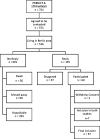Identifying unmet needs in long-term stroke care using in-depth assessment and the Post-Stroke Checklist - The Managing Aftercare for Stroke (MAS-I) study
- PMID: 31008354
- PMCID: PMC6453198
- DOI: 10.1177/2396987318771174
Identifying unmet needs in long-term stroke care using in-depth assessment and the Post-Stroke Checklist - The Managing Aftercare for Stroke (MAS-I) study
Erratum in
-
Corrigendum.Eur Stroke J. 2019 Dec;4(4):NP2-NP4. doi: 10.1177/2396987319870743. Epub 2019 Aug 9. Eur Stroke J. 2019. PMID: 31903436 Free PMC article.
Abstract
Introduction: Detailed data on the long-term consequences and treatment of stroke are scarce. We aimed to assess the needs and disease burden of community-dwelling stroke patients and their carers and to compare their treatment to evidence-based guidelines by a stroke neurologist.
Methods: We invited long-term stroke patients from two previous acute clinical studies (n = 516) in Berlin, Germany to participate in an observational, cross-sectional study. Participants underwent a comprehensive interview and examination using the Post-Stroke Checklist and validated standard measures of: self-reported needs, quality of life, overall outcome, spasticity, pain, aphasia, cognition, depression, secondary prevention, social needs and caregiver burden.
Results: Fifty-seven participants (median initial National Institutes of Health Stroke Scale score 10 interquartile range 4-12.75) consented to assessment (median 41 months (interquartile range 36-50) after stroke. Modified Rankin Scale was 2 (median; interquartile range 1-3), EuroQoL index value was 0.81 (median; interquartile range 0.70-1.00). The frequencies for disabilities in the major domains were: spasticity 35%; cognition 61%; depression 20%; medication non-compliance 14%. Spasticity (p = 0.008) and social needs (p < 0.001) had the strongest impact on quality of life. The corresponding items in the Post-Stroke Checklist were predictive for low mood (p < 0.001), impaired cognition (p = 0.015), social needs (p = 0.005) and caregiver burden (p = 0.031). In the comprehensive interview, we identified the following needs: medical review (30%), optimization of pharmacotherapy (18%), outpatient therapy (47%) and social work input (33%).
Conclusion: These results suggest significant unmet needs and gaps in health and social care in long-term stroke patients. Further research to develop a comprehensive model for managing stroke aftercare is warranted.Clinical Trial Registration: clinicaltrials.gov NCT02320994.
Keywords: Stroke; aftercare; healthcare research; long-term management.
Figures
Similar articles
-
Social work support and unmet social needs in life after stroke: a cross-sectional exploratory study.BMC Neurol. 2019 Sep 6;19(1):220. doi: 10.1186/s12883-019-1451-y. BMC Neurol. 2019. PMID: 31492151 Free PMC article.
-
[Position paper on stroke aftercare of the German Stroke Society-Part 2: concept for a comprehensive stroke aftercare].Nervenarzt. 2022 Apr;93(4):377-384. doi: 10.1007/s00115-021-01232-8. Epub 2021 Dec 21. Nervenarzt. 2022. PMID: 34932125 Free PMC article. Review. German.
-
Unmet Needs for Rehabilitative Management in Common Health-Related Problems Negatively Impact the Quality of Life of Community-Dwelling Stroke Survivors.Front Neurol. 2021 Dec 23;12:758536. doi: 10.3389/fneur.2021.758536. eCollection 2021. Front Neurol. 2021. PMID: 35002922 Free PMC article.
-
Post Soft Care: Italian implementation of a post-stroke checklist software for primary care and identification of unmet needs in community-dwelling patients.Neurol Sci. 2018 Jan;39(1):135-139. doi: 10.1007/s10072-017-3140-1. Epub 2017 Oct 30. Neurol Sci. 2018. PMID: 29086123
-
[Position paper on stroke aftercare of the German Stroke Society-Part 1: long-term care after stroke: status quo of the reality and deficits of care in Germany].Nervenarzt. 2022 Apr;93(4):368-376. doi: 10.1007/s00115-021-01231-9. Epub 2022 Jan 3. Nervenarzt. 2022. PMID: 34978578 Free PMC article. Review. German.
Cited by
-
Malnutrition risk and oropharyngeal dysphagia in the chronic post-stroke phase.Front Neurol. 2022 Sep 28;13:939735. doi: 10.3389/fneur.2022.939735. eCollection 2022. Front Neurol. 2022. PMID: 36247786 Free PMC article.
-
Rehabilitation at Home With the Development of a Sustainable Model Placing the Person's Needs and Environment at Heart: Protocol for a Multimethod Project.JMIR Res Protoc. 2024 Jul 23;13:e56996. doi: 10.2196/56996. JMIR Res Protoc. 2024. PMID: 39042448 Free PMC article.
-
Social work support and unmet social needs in life after stroke: a cross-sectional exploratory study.BMC Neurol. 2019 Sep 6;19(1):220. doi: 10.1186/s12883-019-1451-y. BMC Neurol. 2019. PMID: 31492151 Free PMC article.
-
Eslicarbazepine acetate in post-stroke epilepsy: Clinical practice evidence from Euro-Esli.Acta Neurol Scand. 2020 Dec;142(6):563-573. doi: 10.1111/ane.13323. Epub 2020 Aug 12. Acta Neurol Scand. 2020. PMID: 32691850 Free PMC article.
-
[Position paper on stroke aftercare of the German Stroke Society-Part 2: concept for a comprehensive stroke aftercare].Nervenarzt. 2022 Apr;93(4):377-384. doi: 10.1007/s00115-021-01232-8. Epub 2021 Dec 21. Nervenarzt. 2022. PMID: 34932125 Free PMC article. Review. German.
References
-
- Kumar S, Selim MH, Caplan LR. Medical complications after stroke. Lancet Neurol 2010; 9: 105–118. - PubMed
-
- Ullberg T, Zia E, Petersson J, et al. Perceived unmet rehabilitation needs 1 year after stroke: an observational study from the Swedish Stroke Register. Stroke 2016; 47: 539–541. - PubMed
-
- McKevitt C, Fudge N, Redfern J, et al. Self-reported long-term needs after stroke. Stroke 2011; 42: 1398–1403. - PubMed
-
- van de Port IGL, van den Bos GAM, Voorendt M, et al. Identification of risk factors related to perceived unmet demands in patients with chronic stroke. Disabil Rehabil 2007; 29: 1841–1846. - PubMed
Associated data
LinkOut - more resources
Full Text Sources
Medical



